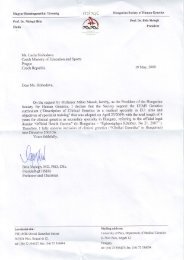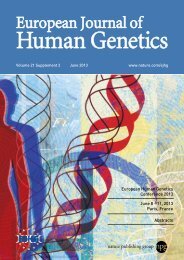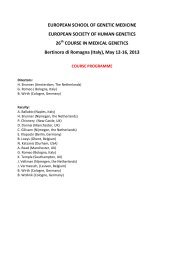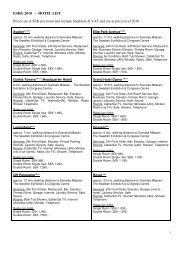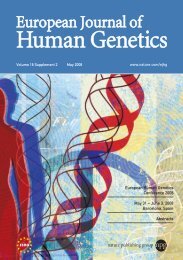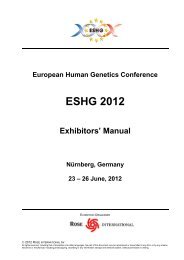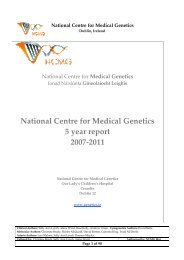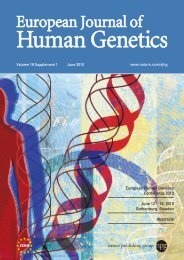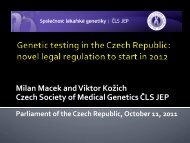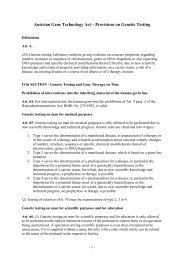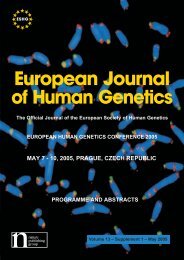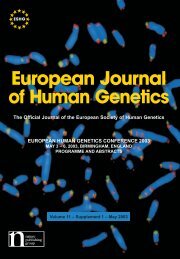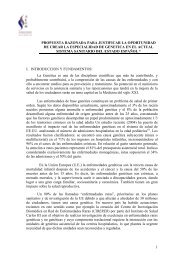Minutes of the meeting - European Society of Human Genetics
Minutes of the meeting - European Society of Human Genetics
Minutes of the meeting - European Society of Human Genetics
You also want an ePaper? Increase the reach of your titles
YUMPU automatically turns print PDFs into web optimized ePapers that Google loves.
3. ESHG highlights (Jean Jacques Cassiman, vice president)<br />
Brief presentation <strong>of</strong> latest news.<br />
4. ESHG future activities (Dian Donnai, president)<br />
Stressed ESHG’s role as “The voice <strong>of</strong> human genetics in Europe” and <strong>the</strong> great importance <strong>of</strong><br />
<strong>the</strong> link with <strong>the</strong> national societies.<br />
Mentioned <strong>the</strong> role <strong>of</strong> IFHGS, and that ESHG is ready to take a stronger role <strong>the</strong>rein and in<br />
relation to ASHG.<br />
Talked about EGF, its courses, and <strong>the</strong> continuous support ESHG has given and aims at<br />
giving in <strong>the</strong> future. Peter Farndon, our new EGF liaison <strong>of</strong>ficer, will have a close follow-up on<br />
<strong>the</strong> collaboration between ESHG and EGF.<br />
5. Website / Flash letter / Newsletter (Helena Kääriainen, secretary general)<br />
Orientation about our new electronic news letter, and <strong>the</strong> possibility for <strong>the</strong> NHGS to present<br />
news and information <strong>the</strong>re.<br />
There will be only one paper-newsletter per year.<br />
Mentioned <strong>the</strong> possibility to make links to o<strong>the</strong>r pr<strong>of</strong>essionals working in genetics in Europe.<br />
The ESHG website is currently being redesigned. Jerome del Picchia gave a brief orientation<br />
about this.<br />
6. ESHG courses and ESHG supported courses (Jerome del Picchia, executive <strong>of</strong>ficer)<br />
The new course application form will be ready within a month. The limit on <strong>the</strong> amount <strong>of</strong><br />
money that can be used for this was underlined – and that this is just a little support on top<br />
<strong>of</strong> what one can get one self.<br />
For ESHG courses, <strong>the</strong> support by ESHG will be decided individually for each course. For<br />
ESHG supported courses, ESHG gives fellowships and up to 5000 euros for organisational<br />
support.<br />
7. Double membership NHGS and ESHG (Jerome del Picchia, executive <strong>of</strong>ficer)<br />
Orientation given. The U.K. system where ESHG membership costs 35 euros extra on top <strong>of</strong><br />
<strong>the</strong> national membership can also be applied to o<strong>the</strong>r countries. The system has so far bee a<br />
great success in <strong>the</strong> U.K.<br />
Such double membership gives online access to <strong>the</strong> journal (Eur J Hum Genet), membership<br />
access to <strong>the</strong> ESHG website, and greatly reduced conference rates. Jerome del Picchia will<br />
approach <strong>the</strong> NHGSs interested in this possibility with concrete suggestions on how to<br />
achieve this.<br />
8. EU Council recommendation on <strong>European</strong> Action in <strong>the</strong> field <strong>of</strong> rare diseases:<br />
Relation to EU-wide recognition <strong>of</strong> clinical genetics in Europe (president-elect, Milan<br />
Macek jr.)<br />
The positive recent developments on this issue were outlined, and it is likely that clinical<br />
genetics soon will be a new pan-<strong>European</strong> primary medical speciality.<br />
The importance <strong>of</strong> lobbying towards national representatives was stressed to ensure UEMS<br />
endorsement <strong>of</strong> <strong>the</strong> proposal that has been forwarded. In addition, a a letter recommending<br />
EU recognition <strong>of</strong> <strong>the</strong> clinical genetics speciality was circulated for <strong>the</strong> representatives to sign.<br />
A shadow clinical genetic board <strong>of</strong> <strong>the</strong> UEMS will be assembled at <strong>the</strong> next <strong>meeting</strong> in<br />
Go<strong>the</strong>nburg.<br />
9. Ad hoc committee for laboratory genetics (Gunnar Houge, secretary general elect)<br />
Feedback from <strong>the</strong> members were received, specifically:<br />
- not to make any difference between MDs and non-MDs in relation to <strong>the</strong> speciality in<br />
laboratory genetics.<br />
- maybe a member from <strong>the</strong> ad hoc committee for a speciality in clinical genetics should be<br />
included.<br />
- collect information about current status in <strong>the</strong> various countries and make databases on<br />
e.g. formal requirements and <strong>the</strong> laboratory specialities already in place.<br />
10. Ad hoc committee for genetic nurses and counsellors (Hea<strong>the</strong>r Skirton, co-chair)<br />
They have now 82 members across Europe from 24 different countries in <strong>the</strong> <strong>European</strong><br />
counsellors network. See www.engnc.org. New members are encouraged to join.<br />
The main work is focused on developing pr<strong>of</strong>essional standards for this pr<strong>of</strong>ession within<br />
Europe, outline a career path, and work towards <strong>the</strong> goal that a genetic counsellor is a<br />
protected pr<strong>of</strong>essional name within Europe. The minimum standard for practise should be on



